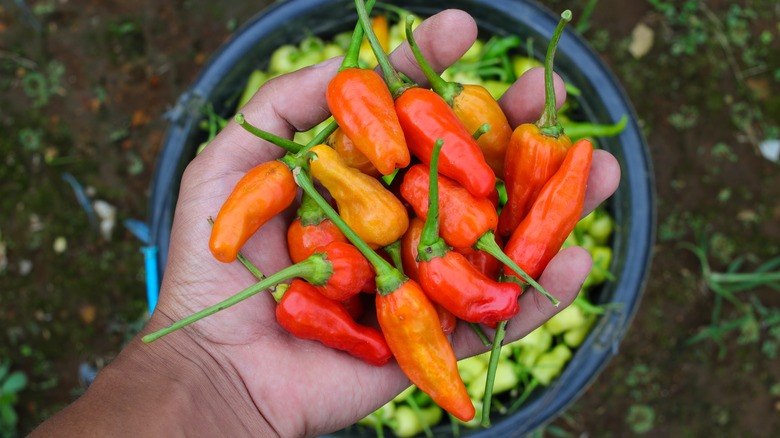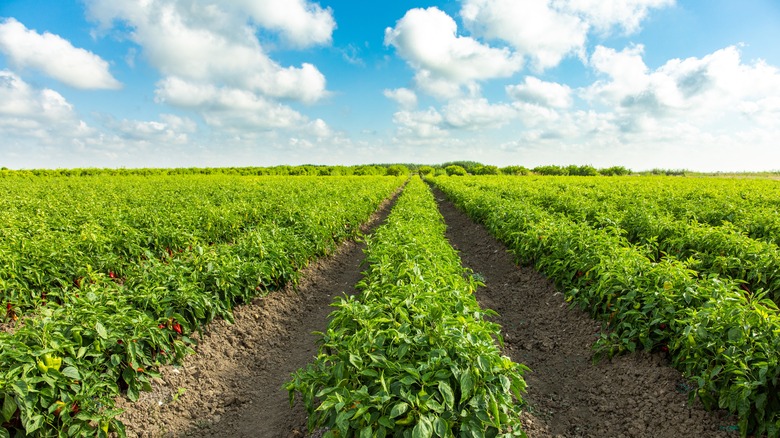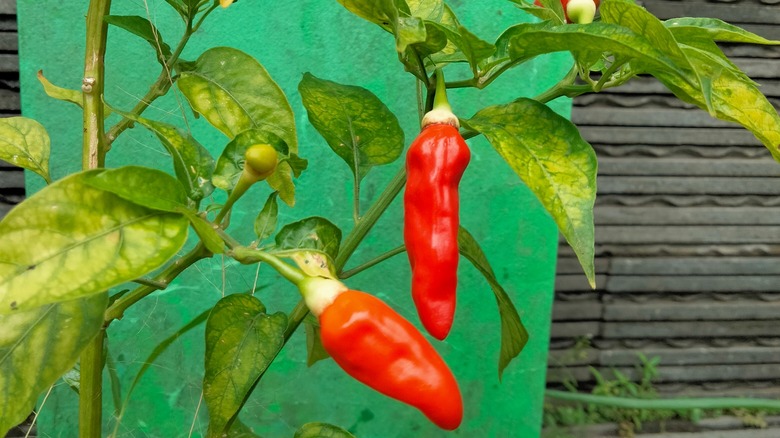These Unique Peppers Only Thrive In One Floridian City
There are some foods that seem to be unconditionally associated with a particular place. Take peaches, for example. It's almost impossible to think of peaches without thinking of Georgia, but here's a fun fact that proves there's always more to the story: The state that produces the most peaches is not Georgia at all. Georgia isn't even a close second, and that's enough to make anyone believe everything they've ever known is a lie. Just as interesting, though, is the legitimate fact that there is one food that's as strongly connected to a single place of origin as we think peaches are — and it's a pepper.
The datil pepper is grown almost exclusively in St. Augustine, Florida. Specifically, this strange pepper only thrives in around a 50-mile radius from the city, and although people have tried to take the peppers and grow them elsewhere, it never seems to work. The plants just don't flourish. Why? It's believed that there's just something perfect about not only the climate of St. Augustine, but also the addition of the salty air. Whatever it is, it's clearly some kind of magic.
This extra-hot pepper is a mystery in more ways than one, and it turns out that no one is exactly sure where they came from or how they became so firmly rooted in St. Augustine. There are, however, plenty of theories, and there are even more fans of this deliciously spicy pepper.
There are numerous theories about where the pepper came from
It turns out that there are a number of different stories about where datil peppers came from. Which one's right? No one knows for sure. First, there was the story that suggested the pepper had been brought to the New World by indentured servants traveling from the Mediterranean. However, there's another theory that suggests the peppers were introduced to St. Augustine as goods moved along the trade route connecting Cuba and Spain to Florida, and yet another credits Roman Catholic priests for bringing in the peppers to supply a group of settlers from Spanish Menorca.
Still another theory suggests that it's descended from peppers called a Fatalii, which could have been imported during the African slave trade. And we're not done quite yet, as another story puts the introduction of the datil pepper at much later than that, with the 1880s arrival of a Chilean jelly maker.
Why has it proven so difficult to trace these peppers to their origin? Interestingly, the datil pepper has only been growing in St. Augustine for a few hundred years, but in that time, it's become a completely unique species of pepper that's unlike others that grow in the proposed countries of origin. Even stranger: As late as the mid-1980s, the datil pepper was still largely unknown outside of the immediate area.
What does a datil pepper taste like, and where can non-Floridians get them?
Chili pepper connoisseurs know that there are a variety of different peppers and uses for them all, so what about datil peppers? These peppers aren't for the faint of heart, and typically clock in at somewhere between 100,000 and 300,000 on the Scoville scale. That's in the same area as a Scotch bonnet or habanero, so if you're looking at putting some datil pepper hot sauce on your wings, you might want to keep that in mind. It's not all heat, though, and datil peppers are lauded for having an unmistakably delicious sweetness that's lacking in many other hot peppers.
For the fresh peppers, you'll almost certainly have to head to St. Augustine, but don't plan on just strolling into a grocery store and picking up a bushel or two. The city's unique climate helps ensure that they're never out of season, but they're more commonly found in farmer's markets.
If you happen to be taking a road trip, there are plenty of opportunities in St. Augustine to sample them as they're a favorite in local restaurants — including some of Florida's must-try BBQ joints. There are also some Florida breweries that use datil peppers in their beers. But if you're not planning on heading south, there are plenty of datil pepper hot sauces available online, and with a little searching, you can also find spice rubs, jellies, mustards, salsas, and even vinegars.


